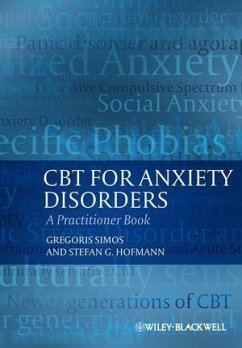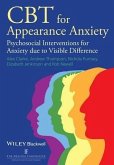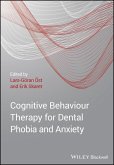CBT for Anxiety Disorders presents a comprehensive overview of the latest anxiety disorder-specific treatment techniques contributed by the foremost experts in various CBT approaches.
- Summarizes the state-of-the-art CBT approaches for each of the DSM anxiety disorders
- Represents a one-stop tool for researchers, clinicians, and students on CBT for anxiety disorders
- Features world leading CBT authors who provide an up to date description of their respective treatment approaches in a succinct, and clinician-tailored, fashion
Dieser Download kann aus rechtlichen Gründen nur mit Rechnungsadresse in D ausgeliefert werden.
This is an excellent book with outstanding contributions by theworld's experts on anxiety disorders. If you want to know thestate-of-the-art research, theory and treatment approaches foranxiety disorder then you must get this book. CBT for AnxietyDisorders: A Practitioners Book, edited by Gregoris Simos andStefan G Hofmann, is a book that I will recommend to all of ourtrainees and a book that I will use often.--ProfessorRobert L. Leahy, Director, American Institute for CognitiveTherapy, NYC.
The editors have assembled an impressive array of some of theforemost experts in the field of anxiety disorders. This textprovides a contemporary perspective of cognitive-behavioraltreatment that combines research findings with clinicalperspicacity. Each chapter is written in a clear and concisefashion and offers concrete clinical examples, yielding excellenthands on application. This book belongs in the library of anyserious researcher or practitioner who works with anxietydisorders. I highly recommend it.--Frank M. Dattilio,Department of Psychiatry, Harvard Medical School
Cognitive behavior therapy (CBT) has become the gold standardfor the psychological treatment of anxiety disorders around theworld. But CBT approaches have developed and changed with the timesbased on new scientific findings and clinical experience, and thisvery handy and readable reference written by leading internationalauthorities incorporates all of these changes. Anybody whotreats anxiety disorders with CBT will find this bookinvaluable.--Professor David H. Barlow, Professor ofPsychology and Psychiatry, Boston University
Effective treatments on a sound scientific basis: Anxietydisorders can be overcome, and this book shows the latestdevelopments how to help the patients.--Dr. Winfried Rief,Professor of Psychology and Psychotherapy and Head of the Clinic onPsychological Interventions, University of Marburg,Germany.
I find the book to be an excellent summary of cognitive therapytechniques as applied to problems encountered in clinicalpractice. It is scientifically and clinically sound,describing not only therapies that in the last decade have becomewell established, but also newer approaches that are emerging asvaluable additions to the therapist'srepertoire.--Walton T. Roth, M.D., Professor Emeritus ofPsychiatry and Behavioral Sciences, Stanford University School ofMedicine.
The editors have assembled an impressive array of some of theforemost experts in the field of anxiety disorders. This textprovides a contemporary perspective of cognitive-behavioraltreatment that combines research findings with clinicalperspicacity. Each chapter is written in a clear and concisefashion and offers concrete clinical examples, yielding excellenthands on application. This book belongs in the library of anyserious researcher or practitioner who works with anxietydisorders. I highly recommend it.--Frank M. Dattilio,Department of Psychiatry, Harvard Medical School
Cognitive behavior therapy (CBT) has become the gold standardfor the psychological treatment of anxiety disorders around theworld. But CBT approaches have developed and changed with the timesbased on new scientific findings and clinical experience, and thisvery handy and readable reference written by leading internationalauthorities incorporates all of these changes. Anybody whotreats anxiety disorders with CBT will find this bookinvaluable.--Professor David H. Barlow, Professor ofPsychology and Psychiatry, Boston University
Effective treatments on a sound scientific basis: Anxietydisorders can be overcome, and this book shows the latestdevelopments how to help the patients.--Dr. Winfried Rief,Professor of Psychology and Psychotherapy and Head of the Clinic onPsychological Interventions, University of Marburg,Germany.
I find the book to be an excellent summary of cognitive therapytechniques as applied to problems encountered in clinicalpractice. It is scientifically and clinically sound,describing not only therapies that in the last decade have becomewell established, but also newer approaches that are emerging asvaluable additions to the therapist'srepertoire.--Walton T. Roth, M.D., Professor Emeritus ofPsychiatry and Behavioral Sciences, Stanford University School ofMedicine.









